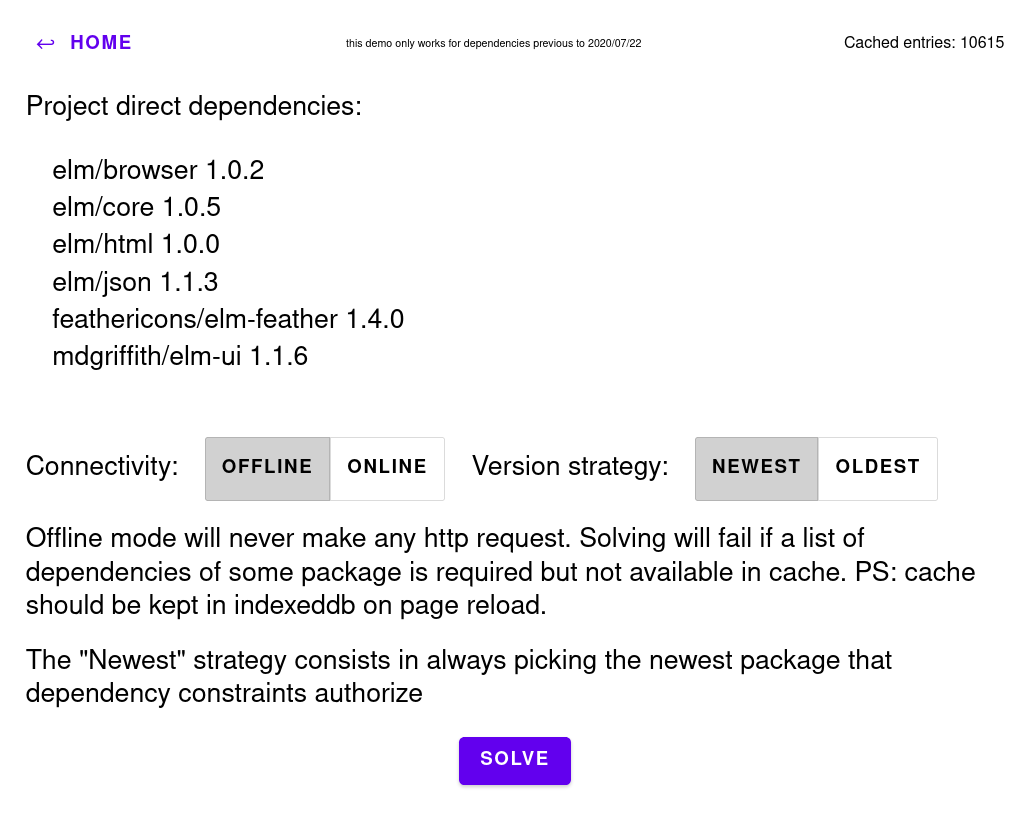elm-pubgrub
This package provides an implementation of the PubGrub version solving algorithm in the Elm programming language.
It consists in efficiently finding a set of packages and versions that satisfy all the constraints of a given project dependencies. In addition, when that is not possible, PubGrub tries to provide a very human-readable and clear explaination as to why that failed. Below is an example of explanation present in the introductory blog post about PubGrub (elm-pubgrub is almost there ^^).
Because dropdown >=2.0.0 depends on icons >=2.0.0 and root depends
on icons <2.0.0, dropdown >=2.0.0 is forbidden.
And because menu >=1.1.0 depends on dropdown >=2.0.0, menu >=1.1.0
is forbidden.
And because menu <1.1.0 depends on dropdown >=1.0.0 <2.0.0 which
depends on intl <4.0.0, every version of menu requires intl
<4.0.0.
So, because root depends on both menu >=1.0.0 and intl >=5.0.0,
version solving failed.The algorithm is generic and works for any type of dependency system with the following caracteristics, not only Elm packages.
- Versions use the semantic versioning scheme (Major.Minor.Patch).
- Packages cannot be simultaneously present at two different versions.
- Dependencies are expressed in one of the following forms
- exact version (
foo 1.0.0 depends bar 1.0.0) - higher or equal version (
foo 1.0.0 depends on bar >= 1.0.0) - stricly lower version (
foo 1.0.0 depends on bar < 2.0.0) - ranges of versions (
foo 1.0.0 depends on bar 1.0.0 <= v < 2.0.0)
- exact version (
PS: at publication, modules in the PubGrub.Internal namespace will not be exposed.
Examples
Two examples are located in the examples/ folder.
The conflict_resolution example, is a rather simple usage of the library
with a custom dependency system (not Elm packages).
You can start it easily with elm-reactor or elm-live.
The second example is an advanced usage of the library API,
in order to create a dependency solver for actual Elm packages.
You can build it locally with elm-live src/Main.elm -- --output=Main.j
or just try it online directly at
https://mpizenberg.github.io/elm-pubgrub/.

API
The algorithm is provided in two forms, synchronous and asynchronous.
The synchronous API is quite straightforward.
The async one uses the Effect pattern to be easily integrated
into the TEA architecture.
The API documentation is available on elm-doc-preview.
Direct sync call
PubGrub.solve config package versionWhere config provides the list of available packages and versions,
as well as the dependencies of every available package.
The call to PubGrub.solve for a given package at a given version
will compute the set of packages and versions needed.
Async API
Sometimes, it is too expensive to provide upfront the list of all packages and versions, as well as all dependencies for every one of those. This may very well require some network or other async requests. For this reason, it is possible to run the PubGrub algorithm step by step. Every time an effect may be required, it stops and informs the caller, which may resume the algorithm once necessary data is loaded.
PubGrub.update : Cache -> Msg -> State -> ( State, Effect )The Effect type is public to enable the caller to perform
the required task before resuming.
The Msg type is also public to drive the algorithm according
to what was expected in the last effect when resuming.
At any point between two update calls,
the caller can update the Cache of already loaded data.
The algorithm informs the caller that all is done
when the SignalEnd result effect is emitted.
PubGrub
PubGrub is a version solving algorithm, written in 2018 by Natalie Weizenbaum for the Dart package manager. It is supposed to be very fast and to explain errors more clearly than the alternatives. An introductory blog post was published on Medium by its author.
The detailed explanation of the algorithm is provided on GitHub. The foundation of the algorithm is based on ASP (Answer Set Programming) and a book called "Answer Set Solving in Practice" by Martin Gebser, Roland Kaminski, Benjamin Kaufmann and Torsten Schaub.